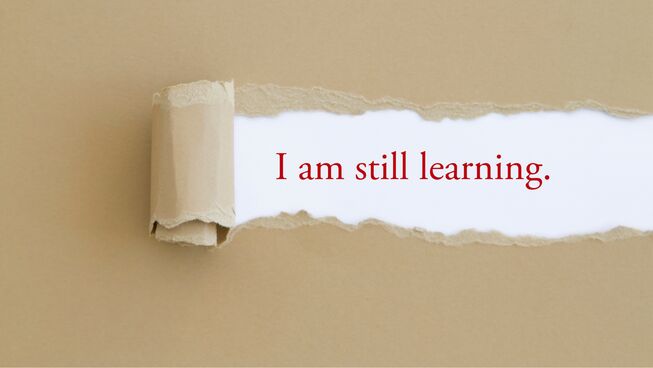Why values are the great value-add in life

My boss once said to me that I backed the men on our staff team into a corner. My immediate response was one of denial. It’s important to me to be cooperative, a good team player, and that wasn’t quite the behaviour I wanted to be known for.
My boss looked at me. I looked at him. Eventually I said: “So how do I back the men into a corner?” He said: “It’s the way you ask questions”.
Over the next few days I thought about my boss’ comment. I realised I did ask a lot of questions in staff meetings. And my questions—more often than not—did have an edge to them. I worked out that I asked a lot of questions because I didn’t feel like I was being heard. I thought my years of experience with the company had earned me the right to be heard. Some sort of recognition of my competency was important to me. I didn’t care so much about this as a younger woman, but now that I’m in the “senior” category, I’m afraid of being less visible among my male colleagues.
I decided to stop my somewhat aggressive line of questioning in staff meetings and to see what happened.
To be clear, it’s not that I suddenly became a wallflower in staff meetings. I continued to speak up—and I will always speak up. I just found a way to do it without such an aggressive edge. The men on my team were more responsive and became more willing to ask for my input (fair enough, no one likes to be backed into a corner!). So I felt like my competency was being acknowledged. And I felt much better in terms of being a good team player.
Our personal values are what’s important to us. They are settled patterns of behaviour and feeling. They are what a friend would say is driving us if they observed us for a couple of days. Two of mine are cooperation and competency.
Our personal values are what motivates our behaviour as well as how we judge our actions, as you can see from my little story above.
When we live in step with what’s important to us, we are energised, liberated and fulfilled. Work was so much more satisfying post the somewhat-aggressive-line-of-questioning-era. When we don’t live in step with what’s important to us - it can be draining and destructive. I wasn’t happy backing the men into a corner and I bet they didn’t enjoy it either.
That’s what makes understanding our personal values the great life value-add.
Identifying our personal values
Cooperation and competency might not be important to you. That’s fine! Our personal values will differ from person to person. They are often formed subconsciously, are influenced by many things (cultural background, family of origin, life experiences, personal preferences etc), and can be hard to articulate because they are vague. They can also shift somewhat over time.
Interestingly - my research discovered that the most common approach to identifying personal values was simply to pick them from a list! (Like the list I have provided below).
Picking values from a list is a bit of a gut-feel exercise, but then values are fuzzy. The challenge in the exercise is to be aware of any natural bias towards the values we think we should have - in other words, making value-judgements on our values.
Valuing our personal values
You may have noticed that in my somewhat-aggressive-line-of-questioning-era, my competency value was dialled up, whereas my cooperation value was almost on mute.
How do we understand and manage conflict in our values? For me, it’s my faith position that provides the insight and the way forward. My faith position is the way I make sense of reality, the lens through which I view the world.
Take competency for example.1 As a follower of Jesus I aspire to treat others as I would like to be treated myself. As Jesus said: “So in everything, do to others what you would have them do to you” [Matthew 7:12]. So with my competency I should be aspiring to use it for the good of others.
However in my somewhat-aggressive-line-of-questioning-era, that had become a little twisted. I became self-focused. I was fixated on my need for acknowledgement of my competency as a way of seeking validation.
In a way it’s not surprising that what is important to us can sometimes end up being what defines us. And yet I know with Jesus something else should define me. “Jesus saved us, not because of righteous things we had done, but because of his mercy”. [Titus 3:5] it’s about his mercy, not my competency. What a comforting thought.
The motivation behind the decision to stop my somewhat-aggressive-line-of-questioning in staff meetings was actually my faith position. When I looked at my competency value through the lens of my faith position, my values got re-ordered and redefined. I could engage more thoughtfully in staff meetings. That then gave my cooperation value some more airtime. And it was a blessing that some of the men on my staff team responded positively to my efforts.
The more we can understand and manage conflict in our values, the more our personal values can be the great life value-add.
Next steps
1) Have a go at identifying your personal values through a pdf exercise here
2) Why did you choose these things?
3) Can you think of a situation where your personal values have come (or could come) into conflict?
4) How will you understand and manage that conflict?
Hope you find the exercise valuable!
--
1. If you are also a follower of Jesus, you might be a little surprised that competency is one of my values. There are lists of “virtues” in the Bible - patience, kindness, mercy etc which spring from the character of God, whom we are to imitate. However, I would argue that there is still a place for competency (which doesn’t appear on any virtues list). That competency is important to me is an expression of the personality, cultural background, family of origin and life experience—among other things—that God, as my creator, has given me. Love is at the heart of the character of God, underpins all of the virtues, and—for me—should be how I understand and manage all of my values.






